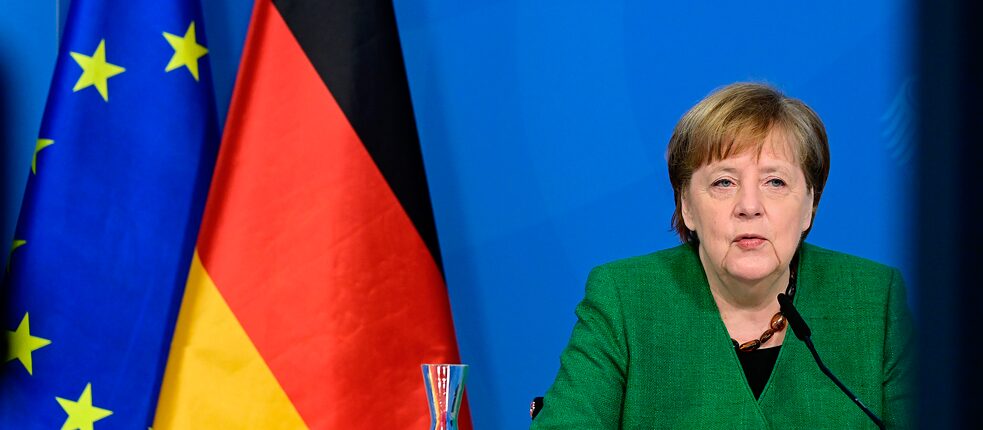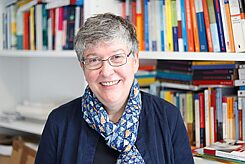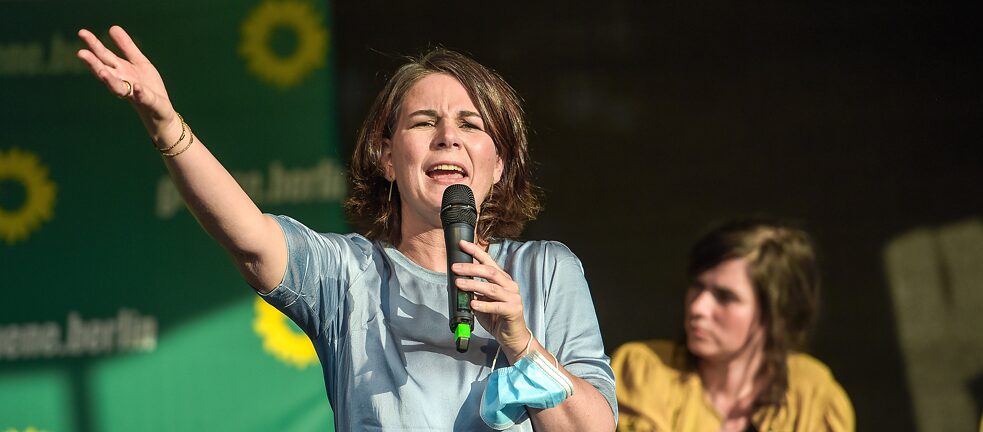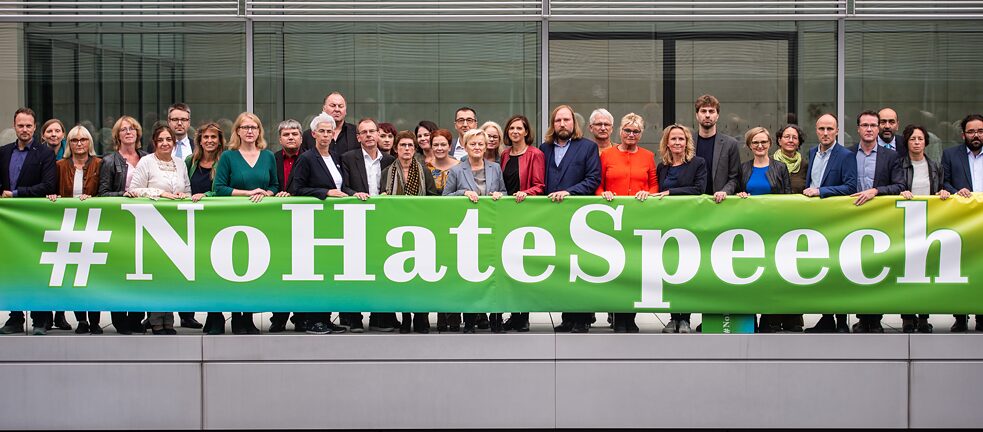Women in politics
“I’m surprised the Merkel government has achieved so little change for women in politics over 16 years”

Germany has been governed by a woman for four parliamentary terms: Chancellor Angela Merkel is also the first woman to hold this senior political office. Yet her chancellorship has not smoothed the way towards a higher ratio of women in politics, as political scientist Barbara Holland-Cunz points out. In this interview she explains how quotas can help, how long it will be before women are represented equally in politics – and why one reason Germany looks so bad is that others are doing better.
By Martina Vetter
 Barbara Holland-Cunz is professor of political science with a focus on women’s studies at the University of Gießen. She is also a member of the board of trustees of the non-profit association “Mehr Demokratie” (More Democracy), which advocates direct involvement of the people, and belongs to the scientific advisory board of the magazine “Gender”. | Photo: © Asya Evcil
Ms Holland-Cunz, women are still considerably underrepresented in politics, you only have to look at the statistics. Until 1983 the proportion of women in the German Bundestag stood at less than 10 per cent. Since then it’s true that the figure has risen substantially – however the balance looked miserable after the last Bundestag election in 2017. The number of female members of parliament dropped from 37 per cent (the highest so far) to a mere 31 per cent. What was the cause of that?
Barbara Holland-Cunz is professor of political science with a focus on women’s studies at the University of Gießen. She is also a member of the board of trustees of the non-profit association “Mehr Demokratie” (More Democracy), which advocates direct involvement of the people, and belongs to the scientific advisory board of the magazine “Gender”. | Photo: © Asya Evcil
Ms Holland-Cunz, women are still considerably underrepresented in politics, you only have to look at the statistics. Until 1983 the proportion of women in the German Bundestag stood at less than 10 per cent. Since then it’s true that the figure has risen substantially – however the balance looked miserable after the last Bundestag election in 2017. The number of female members of parliament dropped from 37 per cent (the highest so far) to a mere 31 per cent. What was the cause of that?
Genuine changes need a lot of time. It’s difficult to balance 3,000 years of patriarchy against 16 years of Angela Merkel. And just because Merkel is a woman doesn’t make it easier for all women to find acceptance in politics. With regard to the ratio of women in politics we’ve been experiencing a sort of stagnation on a national scale since 2002 and we’ve become stuck at the same awful point. Yet, at a global level in fact we’ve fallen far behind: according to the Inter-Parliamentary Union, which counts the percentage of women in the upper and lower houses of parliament worldwide, the German Bundestag occupied 15th place in the lower house rankings at the end of 2005. Today we only rank 54th in the world. Other countries have left us standing thanks to parity laws and party quotas. It’s actually possible to get worse due to others being better.
Would it be a good idea to have a women’s quota to change that?
I was always sceptical of the idea that everything would change if we introduced a quota. On the other hand I don’t see any alternative but to take an institutional approach to this issue. Without a quota for women we are unlikely to achieve much by way of gender equality. Still, a lot has been done in terms of family policy under Chancellor Merkel – especially while Ursula von der Leyen was Minister of Family Affairs. We now have parental allowance, maternity and paternity leave, guaranteed childcare and so on. And it’s quite a big deal if women are able to combine family and career.
Nevertheless women usually do the lion’s share where childcare and domestic chores are concerned.
Of course that’s true, and the corona pandemic in particular has resulted in a dramatic step backwards. Suddenly the mums were cooped up at home again. Equal pay has not progressed in recent years either. Personally I have underestimated the stability of our gender relations – I wouldn’t have thought that women’s politics would have changed so little in the 16 years Merkel has been in power. But maybe that’s too short-sighted. I’ve been active in feminist politics for 40 years, but what I’ve achieved is not in proportion to my political commitment.
Do you think it’s justifiable for chancellor candidate Annalena Baerbock, as a mother of two young children, to be asked how she intends to balance family with her political office?
I think the question is certainly legitimate, but men should be asked exactly the same thing. After all it’s clear that this position of responsibility demands a lot of an individual. However, I think it would be relevant to democratic policy to ask the question: Can’t we organise public service roles differently? It must be possible to perform them without working an 80-hour week – that’s not a people-friendly model for organising politics because it does mean that either the children have to be grown-up already, or politicians need to be childless like Angela Merkel or Olaf Scholz.
 Annalena Baerbock of Bündnis 90/Die Grünen (the Greens) is standing for election in 2021 – which means another woman running for chancellorship: election campaign rally in Berlin. | Photo (detail): © picture alliance/Foto Huebner
After the initial hype, Baerbock had to deal with a lot of criticism. Was that justified?
Annalena Baerbock of Bündnis 90/Die Grünen (the Greens) is standing for election in 2021 – which means another woman running for chancellorship: election campaign rally in Berlin. | Photo (detail): © picture alliance/Foto Huebner
After the initial hype, Baerbock had to deal with a lot of criticism. Was that justified?
Anyone who sugar-coats their résumé and lifts passages in their book from the work of other authors can expect to endure public criticism. Behaviour like this doesn’t give a professional impression.
There were also accusations of plagiarism against Armin Laschet. But unlike Baerbock he didn’t have to endure such a commotion in the digital media. Does that have anything to do with Baerbock being a woman?
In principle it’s true to say that politically active women are far more exposed to hate attacks in a digital environment than men are (see box). But unlike male politicians they are rarely subjected to attacks because of their political stance, it’s more likely to be sexualised hate speech with violent fantasies. Defamatory attacks like this are also responsible for keeping women away from politics. They anticipate how powerfully and aggressively people are attacked in the online world. They need to cut themselves off from it, which isn’t so easy.
None of this sounds as if we can expect an equal balance of men and women any time soon, does it?
Various studies have been carried out relating to this question. If they are right, it could take between 100 and almost 500 years before we have gender equality.
Digital violence against women
Women who are involved in politics receive a deluge of sexist comments and threats of murder, rape, beatings or abduction, especially on social media. For a title story about digital smear campaigns against female politicians in July 2021, Der Spiegel questioned all 222 female members of the Bundestag about how they experience hatred towards women. A resounding 70 per cent stated that they were subjected to misogynistic hate as a member of parliament. 64 per cent had received hate messages (mostly online) and 22 per cent suffered actual attacks to their person, offices, home or building.
 Members of the parliamentary party of Bündnis 90/Die Grünen show solidarity with their former party chairperson Renate Künast: the female politician has spent some time taking legal action against the hatred and smear campaign directed against her on the internet. | Photo (detail): © picture alliance/dpa/Arne Immanuel Bänsch
HateAid, a contact centre for people affected by digital violence that was established in 2018, registered a sharp increase in advice requests in the run-up to the Bundestag elections in 2021. From January to August 2021 the number of requests rose from 187 to 542 compared with the equivalent period in 2020. “There is a big difference between the violence experienced by female politicians and by their male colleagues,” explains CEO Anna-Lena von Hodenberg. “Violence against women in political office is primarily sexualised, they receive sexist insults, rape threats or come across faked nude pictures of themselves online. The subject quickly comes round to their bodies, whether they are fat or thin, what their breasts look like or whether sexual intercourse with them might be desirable. It is noticeable how little regard is given to their political opinions. Women who want to contribute actively to politics and represent their views in public clearly still constitute a provocation for many people, who feel the need to degrade them in public. The internet is the perfect place for that.”
Members of the parliamentary party of Bündnis 90/Die Grünen show solidarity with their former party chairperson Renate Künast: the female politician has spent some time taking legal action against the hatred and smear campaign directed against her on the internet. | Photo (detail): © picture alliance/dpa/Arne Immanuel Bänsch
HateAid, a contact centre for people affected by digital violence that was established in 2018, registered a sharp increase in advice requests in the run-up to the Bundestag elections in 2021. From January to August 2021 the number of requests rose from 187 to 542 compared with the equivalent period in 2020. “There is a big difference between the violence experienced by female politicians and by their male colleagues,” explains CEO Anna-Lena von Hodenberg. “Violence against women in political office is primarily sexualised, they receive sexist insults, rape threats or come across faked nude pictures of themselves online. The subject quickly comes round to their bodies, whether they are fat or thin, what their breasts look like or whether sexual intercourse with them might be desirable. It is noticeable how little regard is given to their political opinions. Women who want to contribute actively to politics and represent their views in public clearly still constitute a provocation for many people, who feel the need to degrade them in public. The internet is the perfect place for that.”